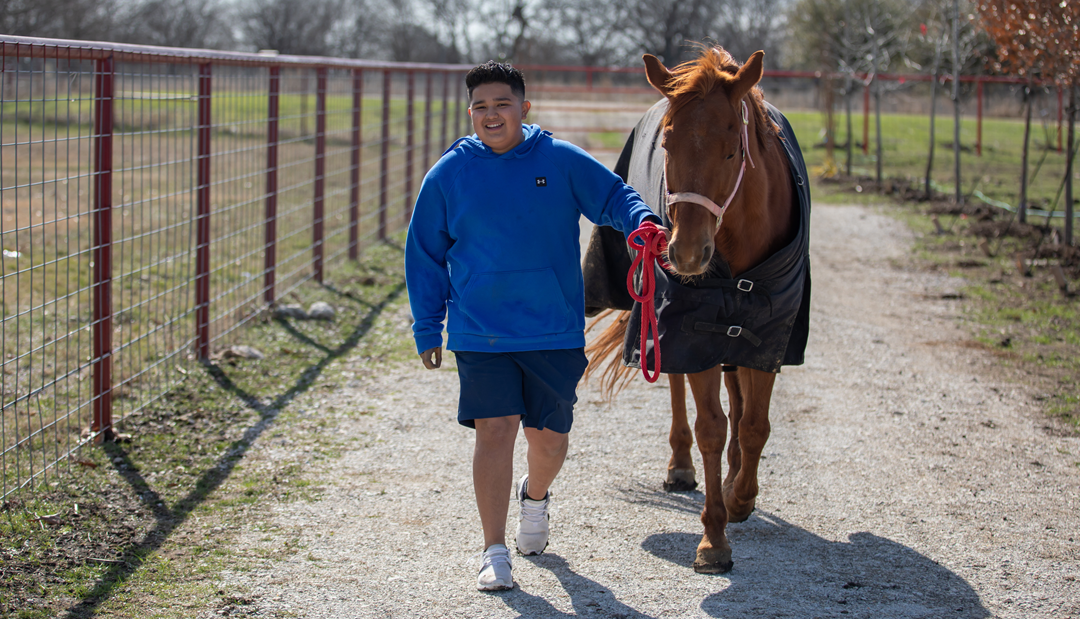Cover story previously published in Rite Up, 2023 – Issue 2.
by Kristi Shewmaker
Ayden, age 13 of Valley View, describes himself as outdoorsy. He learned to ride horses before he could walk. Every day after school, he feeds his flock of sheep that pasture next to the house his father built for the family. When his dad gets home from work, they drive across the highway to feed their horses, ponies, cows, chickens and homing pigeons. Born and raised in the country, Ayden lives with his parents Liz and Sergio and his younger sister and brother on some land they simply call home.
Ayden’s family is close-knit. His grandparents, Liz’s parents, live just across the pasture. Every Sunday, Ayden hops the fence and runs to their house where his grandma makes breakfast for everyone. After their family meal, the guys get to work doing chores around the property.
In February of 2022 while working on the farm, Ayden suffered a traumatic injury with heavy farm equipment and lost his arm. He was transported by CareFlite® to Children’s Medical Center Dallas, a Level 1 Trauma Center, where pediatric orthopedic surgeons Corey S. Gill, M.D., M.A., and Jaysson T. Brooks, M.D., performed an amputation and reconstruction of Ayden’s right arm above the elbow. “I didn’t think anything could be done to save any part of his arm,” Liz says, “but they did an amazing job, and I’m thankful for that.”
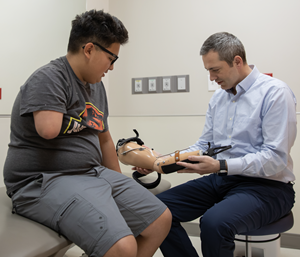
A few weeks after surgery, Ayden and his family reunited with Dr. Gill at Scottish Rite for Children Orthopedic and Sports Medicine Center in Frisco. They also met the multidisciplinary team of experts who would care for Ayden, including pediatric psychologist Emily Gale, Ph.D., prosthetist Dwight Putnam, C.P., L.P., and occupational therapist Lindsey Williams, O.T.R., C.H.T.
“When you lose a limb, the family goes through a process of grief,” Dr. Gill says. “So, it’s really important for our Psychology team to work with them early on.”
During his recovery, Ayden and his family toured the Prosthetics Lab at the Dallas campus to learn about the possibility of wearing a prosthetic arm and how it could be customized for him. “It was important for Ayden to know that whether he has a prosthesis or not, it does not define him,” Dr. Gill says. “He could do things with it or without it, but he was going to be great regardless.” Ayden decided to move forward with the arm. After his limb had time to heal, he would return for an evaluation with Dwight.
In the meantime, Ayden began occupational therapy with Lindsey twice a week. Initially, she focused on caring for his residual limb, including massaging his scar to desensitize the limb in preparation for wearing a prosthesis.
“The day I met Ayden, he was very quiet,” Lindsey says. “He was trying his best, but he didn’t yet know the potential that he had. We were just trying to get rid of his phantom limb pain, trying to cope in that way.” Phantom limb pain occurs when the brain perceives tingling and painful sensations in the limb that is no longer there. To resolve the pain, Lindsey used mirror therapy to trick his brain into thinking his right hand was there.
Because Ayden lost his right arm, and he was righthanded, they also focused on dominance retraining, or training his left hand to become the dominant hand. They worked on strengthening the grip of his left hand, as well as coordination, fine motor skills and handwriting.
After the swelling subsided in Ayden’s limb, Dwight recommended a body-powered prosthetic arm. Built specifically for Ayden, the arm attaches to a prosthetic socket that fits onto his residual limb. The prosthesis is worn with a harness that loops around his left arm. The movement of his shoulder creates tension in the harness that is transferred to a cable system, which moves a terminal device in the form of a hand or a hook. Initially, Ayden chose the hand so that it would look like his fingers. The hand has a tripod grasp, meaning the first two fingers and thumb pinch together to grab objects.
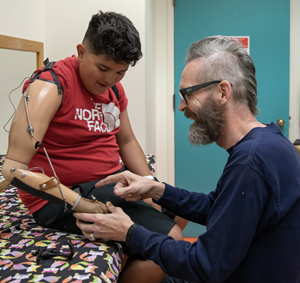
For many months, Ayden worked with Lindsey on completing tasks with his left hand as well as learning how to use his prosthesis. They problem-solved daily activities, like how to get dressed, button buttons and zip zippers. In one session, he learned to tie his shoes with one hand. They also worked on two-handed tasks, like scooping ice cream, opening a sauce packet, and cutting apples and avocados.
“Ayden has grown so much,” Lindsey says. “He comes to appointments prepared with a list of things he wants to work on. Early on, he wanted to help his mom. He brought in clothes to fold and hang. He wanted to be able to take out the trash.”
After a year, Ayden decided to try the hook on the end of his prosthetic arm. He wanted to use it to feed his sheep. The pinch on a hook is stronger and can grasp heavier items. Before his injury, Ayden fed his sheep by pouring grain out of a five-gallon bucket into a trough. Lindsey taught him to use the hook to hold the handle while his left hand tilted the bucket. “Almost instantaneously after we added the hook,” Dwight says, “it has increased his abilities to do the things he used to do and contribute to his family.”
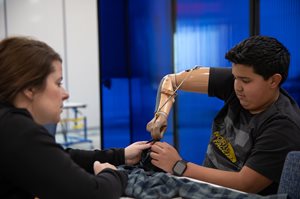
“I think he will continue to explore and find things he wants to do with his prosthesis,” Dr. Gill says. “Whether it is for things around the farm or adaptive sports, it’s our job to help him succeed in whatever he wants to do, and I think he will.”
Now, Lindsey is preparing Ayden for high school. She is teaching him one-handed typing using a Dvorak keyboard, which locates the important letters directly under your hand. They just put new stickers on the keys. “Lindsey has really been a blessing to us,” Liz says.
The best part of his care journey, Ayden says, has been getting help from Lindsey. “I’ve learned that I can still do everything the same,” he says. Liz adds that Ayden says he wants to be Dwight, and later in his life, he wants to build prosthetic limbs.
“At Scottish Rite, they care more about the kids than anything else,” Sergio says. “They actually take care of you. They don’t care if you’re Hispanic, White, Black — whatever color you are — they treat everybody the same.”
In a recent session, Ayden and Lindsey played Jenga®. Ayden grasped a block with his hook. As he wiggled it, it looked like the tower might fall. “But, he got it out,” Lindsey says, “and when it didn’t fall, he had the biggest smile on his face.”
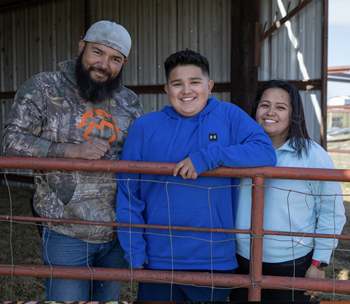
“Nothing is off the table for Ayden,” she says. “The injury was so traumatic for him. It could’ve defeated him, but he has just soared.”
“We can’t thank everyone at Scottish Rite enough,” Liz says. “Something that has been horrible and tragic is turning out to be something wonderful and positive for our child.”

